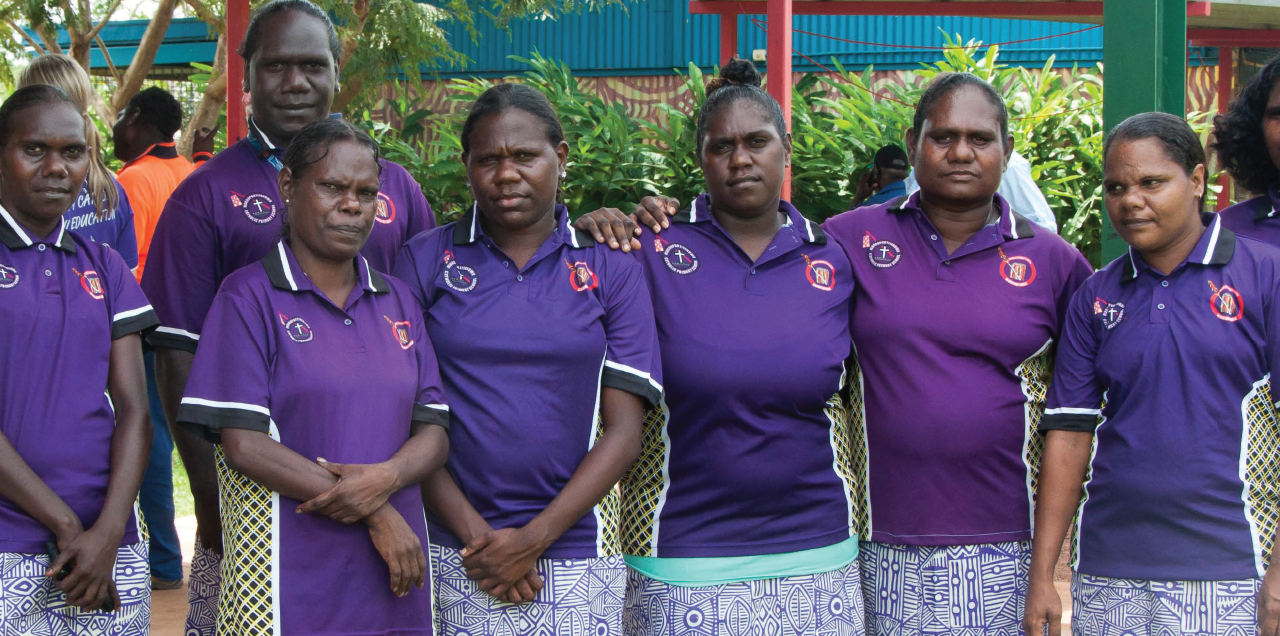Catholic Education
Northern Territory
- Inside-up
- Education Industry
- Northern Territory Diocese of Darwin

The Challenge
High teacher turnover and a lack of continuity makes it difficult for Aboriginal and Torres Strait Islander students who often struggle to meet national education standards. Catholic schools in remote communities struggle to maintain continuity of program delivery and to deliver quality teaching by experienced teachers who understand the local environment.
The Solution
- To offer a quality pre-service Bachelor of Teaching and Learning degree to Aboriginal and Torres Strait Islander Assistant Teachers and staff working in schools within remote communities
- To improve outcomes within remote communities by improving teaching- student ratios, teaching continuity and quality
Implementation
Catholic Education Northern Territory (CENT) partnered with Charles Darwin University (CDU) to introduce the “Growing Our Own (GOO) – Indigenous Teacher Preparation Project” for Catholic schools in five regional areas within the Northern Territory. The program is focused on upskilling existing local Aboriginal and Torres Strait Islander Assistant Teachers, Teacher Aides and school staff, by enrolling them in the Bachelor of Teaching and Learning through CDU.
Organisational strategies
- The most senior level of the Catholic Education Office has committed to support improved equality of access to education services and equity of educational participation.
- CENT revised its processes to enable identification of Aboriginal or Torres Strait Islander staff and is systematically collecting this data to report on.
- CENT established an Indigenous Leadership Team to assist school improvement.
- There is a policy commitment by Catholic Indigenous Community Schools to create learning environments that are responsive to the local culture.
Partnership strategies
- The project involves a collaborative partnership between CENT, Northern Territory Indigenous Catholic Community Schools and CDU.
Program design strategies
- The program involves on-site delivery by CDU every fortnight and mentoring by a designated classroom teacher, who in turn gains improved cultural understanding from the student teacher.
- Most training is done on site, to make it more accessible and easier for students who cannot leave the community due to family commitments.
- The training is customised and contextualised to ensure greater relevancy, and delivered on a one-to-one basis or in a small group.
- Theory and workplace learning and practice are closely integrated.
- Pre-service teachers work three days a week and have two days off to study, so they can earn while they learn.
- Support is provided to graduate teachers to enable smooth transition from Assistant Teachers to fully qualified teachers.
Results
- 18 students have graduated as teachers.
- 15 students are currently studying.
- In 2017 the GOO project won the CDU Vice-Chancellor’s Award for outstanding contribution to student learning.
Lessons Learned
- To increase student engagement levels, use flexible modes of training delivery that are best suited to the local context and offer the training on site.
- To reduce the financial burden and increase commitment, enable students to earn while they learn.
- Hold regular structured meetings with project partners to ensure that the project is kept on track and refined if necessary.
- Be open to changing the program; e.g. instead of fortnightly visits by the university, consider the benefits of short, intensive training sessions.
REQUIREMENTS FOR
REPLICATION
Do you…
- have senior level support?
- have a university or other institution delivering the relevant qualification(s) and willingness to deliver in multiple modes?
- have a cohort available for training?
- have staff with the skill and ability to coach and develop Aboriginal and Torres Strait Islander teachers?
- have an agile and flexible approach to accommodate competing priorities?
- have strong partnerships?
- have the personnel and financial resources required to support delivery of the program?
CONSIDERATIONS FOR PROGRAM SCALING
Do you…
- have the number of staff meeting criteria for the program?
- have universities able to deliver relevant qualification(s)?
Can you…
- release staff as required?
- access appropriate levels of funding?
- identify current and future workforce requirements?
POTENTIAL RISKS
What if…
- support is not sustained across the duration of the course?
- investment is not sustained?
- positions are not available once the qualification is achieved?
- on-site delivery costs are prohibitive?
